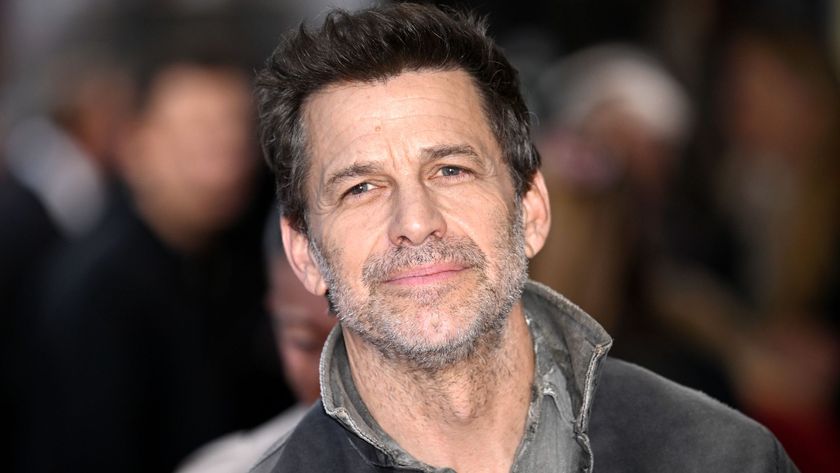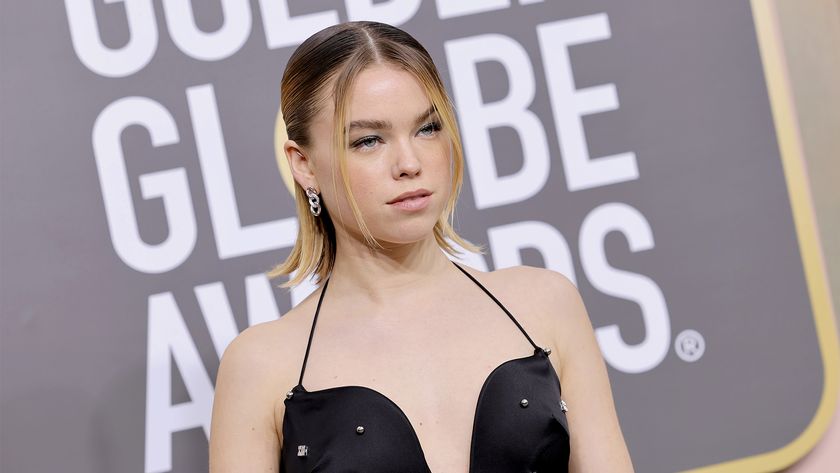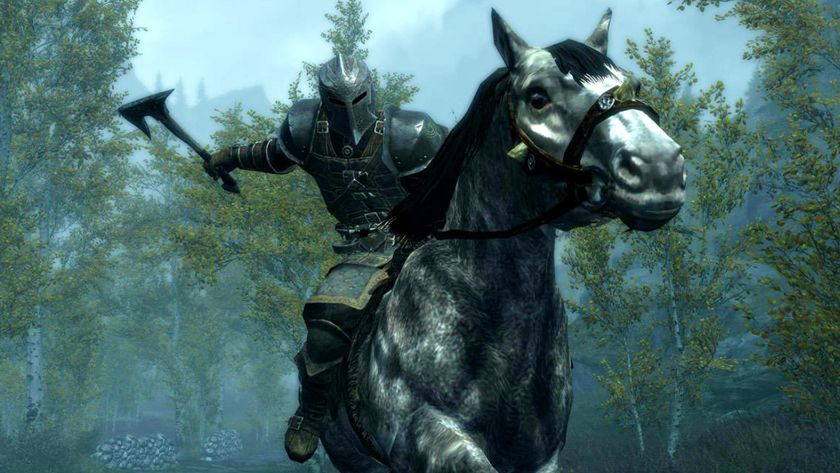The Total Film Interview - Oliver Stone
Oliver Stone's never been one to keep his opinions to himself and it's hardly helped him make friends in Hollywood. But, as he tells Total Film, now that he's older, he's finally getting wiser...
All the interviewers are younger than me now," exclaims Oliver Stone as Total Film walks into his Edinburgh hotel suite. "I always used to be the youngest one..."
At the not-so-tender age of 57, Stone's days as a hellraising enfant terrible may be over but he's still too prickly to settle into the role of elder statesman. One-on-one, he's charm personified but he divides critics and audiences like no other director of the last 20 years - a bold visual stylist and courageous voice of dissent to some; a brash, bullying conspiracy theorist to others.
A Yale graduate and decorated Vietnam veteran, Stone studied under Martin Scorsese at New York University and launched his career in 1978 with the Oscar-winning screenplay for drug-bust nightmare Midnight Express. After a false start with horror flop The Hand, he returned to directing with Salvador in 1986 and won two more Oscars for directing films based on his Vietnam experiences: Platoon and Born On The Fourth Of July.
Since then, it's seemed that Stone can't get out of bed without sparking controversy. His driving obsession is America's dirty secrets: war and conspiracy in the '60s (Platoon, JFK); political betrayal in the '70s (Nixon); greed in the '80s (Wall Street); and media exploitation in the '90s (Natural Born Killers).
With his latest film, he's dealing with his country's neighbouring nemesis, Cuban leader Fidel Castro. Stone is at the Edinburgh Film Festival to promote Comandante, his controversial study of Castro, and to discuss two other low-key political documentaries: Persona Non Grata, which eyes the Middle-East crisis, and Looking For Fidel, which portrays his return to Cuba one year after his original documentary.
After this, Stone's back to work on historical epic Alexander, starring Colin Farrell as the eponymous Macedonian conqueror. Superficially, an intimate TV documentary and a mega-budget historical epic don't have much in common, but both Comandante and Alexander find Stone, in different ways, preparing for battle again. Brawny, tanned and fuelled by a steady stream of black coffee, he seems more than ready for it...
So why did you decide to make a film about Fidel Castro?
I'd done Any Given Sunday in 1999 and I pursued a project called Beyond Borders for about a year, but it didn't get made the way I wanted so I left. I was doing commercials when [producer] Fernando Sulichin called me. Castro had given him access for Spanish television so it was an unpretentious, unambitious chance to see Castro, and it grew into something larger. We thought it would play with American audiences as well but we've had a bit of a setback...
Sign up for the Total Film Newsletter
Bringing all the latest movie news, features, and reviews to your inbox
Yeah, HBO were meant to air it in March, but they've indefinitely shelved it. Any idea why?
There were three shootings of hijackers in Cuba and Castro imprisoned 75 dissidents. And there was tremendous pressure on the island at the time of the Iraq war - there was the Butcher Of Baghdad and the Butcher Of Havana. So I think HBO reacted to the political pressure of the Cuban-American lobby groups. Who knows? It might even have been a call from the White House...
It's clear you got on with Castro during the shoot. But did you ever think, "Hey, this guy's lying to me"?
No, I didn't think he was. I may be wrong. Deception is in the eye of the beholder. If you see deception, that's fine, but at least you have the opportunity to witness it on screen. Castro will talk to you. He's a real human being. Unlike George Bush, who I see as a synthetic person. Is there a real person underneath? Yeah - an ex-alcoholic who believes in Jesus. What could be more dangerous?
Speaking of whom, you've been a fierce opponent of Bush's war on terrorism. Have you considered tackling it in a film?
That's a hard road to go down. I don't know if it would be financed and distributed right now in America. I don't think you can tell the truth. I think you have to be in a situation where Arnold Schwarzenegger is wiping out 500 Arabs in True Lies. The American view of this war on terrorism is still very John Wayne, and it's so immature.
Does your moral outlook as a filmmaker stem from your own experience in Vietnam?
It would stem from that because it was an eye-opener but it didn't necessarily hit me right away. Platoon would be more of the character I was, just shaken up. Born On The Fourth Of July would be the character I was a few years later. I became more radical because I learned more and my perception of what we were doing in the world was changing.
In Comandante, you ask Castro about regrets and he says there's nothing he wishes he hadn't done, but there are things he wishes he'd done better. What are the things you would have done better in your own life?
I wouldn't have made some inappropriate remarks at times [laughs]. I've made some unnecessary enemies. But it was a very hard position. You have to realise that I came up out of Platoon and Salvador, which were angry, defiant films, so at the beginning I was tagged as an angry person. In truth, there's much more balance in my life. There seems to have been a definite core resistance to what I stood for and what I was trying to do, because I seem strong and I speak with a strong voice.
I'm not sure what people in the West expect filmmakers to be. Do they expect us to be conformist to the goals of society? Kubrick wasn't. Remember, when Paths Of Glory came out, it wasn't even shown in France. It was a shock to the French to show them shooting their own soldiers, but they had done so. When you tell the truth you become an exile. It's a tough question: do you speak out or do you not speak out? When I was younger I said, "Speak out! Speak out! Be heard!" Now I'm a little bit older and more wounded... You have to pick your moments.
How proud are you of your Oscars? Do you think you deserve another one?
[Laughs] I think my Oscars are great! It was wonderful I received them, but whatever happens, those films exist and I feel good about that. All of them - Nixon as much as Platoon. Nixon didn't win any Oscars but it's as important to me. I measure my life by those movies. I know what film I was doing and where I was working in any year. Would I like another one? Who wouldn't? But lobbying for it has become ridiculous. It was nice to be innocent, just to receive it. It started to get political in the late '80s and early '90s and now it's distorted. They spend a fortune on these campaigns and it's not worth it, so it becomes a political football.
Going back to your early days, what did you learn from Martin Scorsese at NYU?
He was a wonderful teacher. He had great energy. In those days, we didn't have videos so he'd stay up all night watching late movies on TV. He'd always be late for class, hair down to here, and he'd talk about some little film he'd seen at 3.30 in the morning. It was just amazing that he had such enthusiasm.
I remember we were making short films and they were pretty bad. He told me, "You're doing all this Godard abstract stuff, you're trying to be French New Wave. Do something personal." And that was the key. Once I realised I should stick to what I know, I started to get a lot better. Finally, I made a 12-minute film called Last Year In Vietnam, which was my breakthrough film. We used to have showings and auto-critiques in the class, and everyone was saying, "That's a piece of shit." And he said, "That's a filmmaker." He gave me a great burst of hope.
Before your directing career took off, you wrote Conan The Barbarian, which was directed by John Milius, a vocal right-winger. Did you clash politically?
We identified on one level because John's a great storyteller. He's very humorous. I'm not sure how seriously he takes that stuff. We had a good relationship. I wrote a script which was probably worth $50 million at the time. I had a vision of 12 movies, like a Bond series, but we couldn't get Ridley Scott to do the first one because he was doing Blade Runner. And as a result we sold it to Dino De Laurentiis, which was a mistake. Dino trashed it in two films. John was the director/writer and he changed my script. He liked the ferocity and the vision of what was in there, but he used it his way.
Your next script was Scarface, during which you gave up cocaine. Was it your angry farewell to the drug?
I wanted to get even with it! Because it fucking kicked my ass! I wasn't deeply into it, but enough that I wanted my money back [laughs]. I had been hooked for a year or two and I decided to kick it and I moved to France, which was the best thing I ever did. I cut all my connections to LA, had a new life and wrote Scarface in an apartment in Paris. I wrote it straight which was good because I don't think cocaine helps writing. It's very destructive to the brain cells. I think my writing was getting shallower.
Was there a lot of your own cocaine experience in Tony Montana?
Oh yeah, sure. Are you kidding? That motel scene, I almost lived it myself. I had to walk... [Pauses and smiles] No, I loved that character. It was fun. A tough shoot, but I learned a lot. Brian De Palma was very generous and taught me a lot about filmmaking. I'd done The Hand already, which had failed, but I liked it. He gave me confidence and when I went out three years later to do Salvador, I used a lot of what I learned on Scarface to get it done with no money.
Many of your shoots have been notoriously gruelling. Which film was the most fun to make?
I enjoyed Natural Born Killers even though it was a hard shoot. We were in a prison in Illinois with real prisoners in the riot. They got to beat up and kill their guards! It was pretty wild, all the actors were a little bit crazy. It was a liberating process.
The football movie [Any Given Sunday] was tough physically. That's probably why I didn't make another movie right away, because I just got exhausted. You have to put in a lot of energy to make these big events work. Oh, and I enjoyed The Doors, too. It was fun to have all that music and sexy people around.
What was it like directing Al Pacino in Any Given Sunday, having watched him on the set of Scarface 16 years earlier?
I enjoyed every moment of it. He was great, responsive, sensitive... He's like Anthony Hopkins - the ability to minutely tune his performance. He could fix a clock. I love actors like that because they respond to suggestion. They like it. They want to be provoked. I've always tried to be honest with actors and sometimes that does create problems. Sometimes they don't get talked to that way. I don't like that method of going in and saying, "Great, great, but..."
You must have bumped into Quentin Tarantino since the bust-up over Natural Born Killers. Did you bury the hatchet?
He likes me now, I think. I don't have any grudge against him. It was painful at the time but I think Quentin has matured. I saw him in Beijing doing Kill Bill and had a very nice meeting with him. You know, it's in the past. He'll always have his beef on Natural Born Killers and I'll always like my script better than his [laughs].
Did you sympathise with him, considering you'd also had scripts changed in the past?
It's true. I had my scripts changed. That's the name of the game. He did take the money. He took more money for that than, you know... He said to me, "Why don't you just write your own script?" I said, "If you want to make it then I think you should, but you expressly said that you didn't want to do it." I bought it at the bottom of the pile. It had been around town for a long time and it had been rejected everywhere. So there was no evil intention. I saw something there that was the basis of the movie.
Natural Born Killers epitomises your signature style: fast cuts, different film stocks, sudden juxtapositions, expressionistic camera angles... Have you ever been tempted to do the exact opposite, perhaps trying an intimate two-hander?
I could. I think Heaven And Earth is closer to that. Those who don't like my style call it ADD [Attention Deficit Disorder]. I don't think so. For me there's a nervousness about it, but it's not ADD because it does concentrate on the subject. Often, I use visuals to contradict the words and that throws people, but I like that style because it's the nature of contradiction in life.
If I did the movie you're talking about I'd have to have a hell of a good screenplay, so I would want to stay on the actors' faces. I might do that more with Alexander because it's another time. It's not a contemporary sensibility. I think that would work for Alexander because we have a good screenplay and casting, but if I have problems I'm going to have to figure out some ways around. There's always short cuts. You have to be able to use tricks - trompe l'oeil as the French would say - because it may not work. Actually, I look at French films a lot. Too many of them are naturalistic. They bore me. A lot of independent films are like that, too. And that's fine, but it's not my style. Watching those movies feels like work and I like to be entertained.
Speaking of Alexander, are you pleased that Baz Luhrmann's competing Alexander the Great movie has been postponed?
It's better for us, but on the other hand my race was always with the script. 1989, we started. 1995, we had the script. And then we came back to it in 2000. I believed in Colin [Farrell] way back. He was always my choice and he's got hotter since. I think Colin's got the grit to do it.
I think he's going to surprise some people. He's a great athlete, as Alexander was, and he has that mercurial temperament, which Alexander also had. But Baz has a grandiose vision and if he can pull it off, it will be great. Alexander can take more than one story.
You're about to start shooting. How are you feeling?
It's an exhausting process. We're shooting on three continents - in Morocco, Thailand and London. It's the biggest challenge of my life. I'm quite nervous. I hope to survive and be smiling by February, but it's tough...
The Total Film team are made up of the finest minds in all of film journalism. They are: Editor Jane Crowther, Deputy Editor Matt Maytum, Reviews Ed Matthew Leyland, News Editor Jordan Farley, and Online Editor Emily Murray. Expect exclusive news, reviews, features, and more from the team behind the smarter movie magazine.













